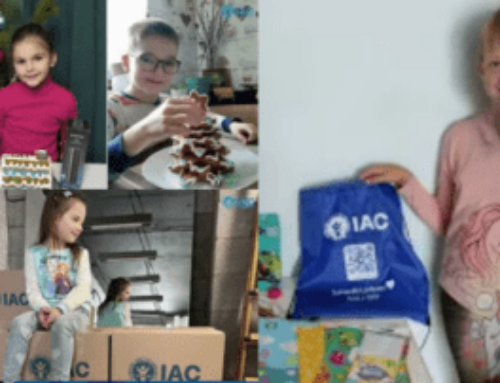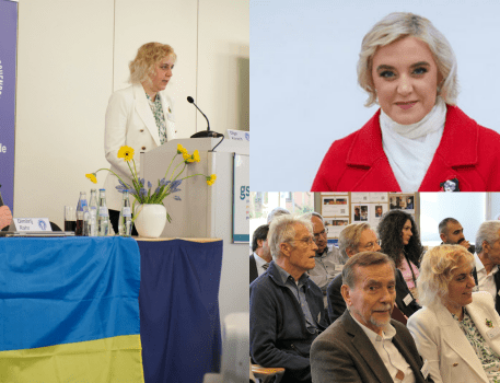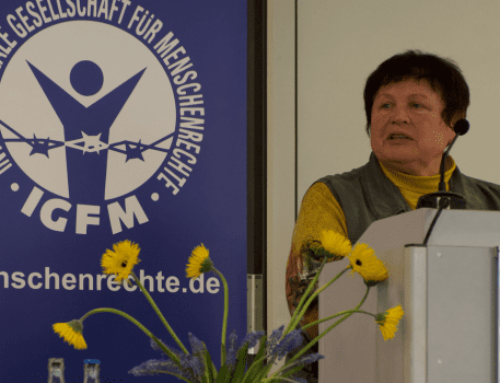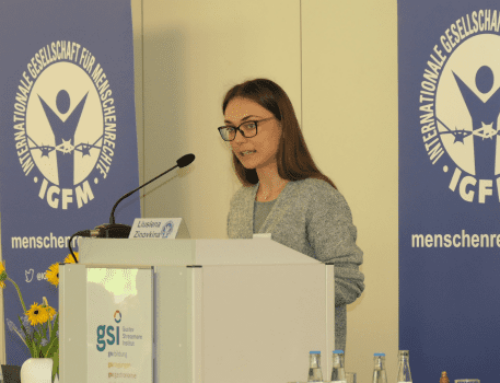
“According to the Lithuanian secret service, there may be agents recruited by the Belarusian secret service among the members of the Belarusian opposition in Lithuania”
I would like to talk about the Lithuanian section, which I have chaired since 2014. We currently have 89 members in the section and the number is still growing. We focus on humanitarian aid, human rights violations, aid for refugees, projects and events. The target groups (pensioners, large families, orphans, war refugees from Ukraine in the Vilnius and Ignalina regions, and Belarusians in exile – in co-operation with Belarusian associations in Vilnius.
We have been working together with the Wittlich working group since 1990 and every year we receive and distribute 10-12 shipments, approx. 80 tonnes of relief supplies, worth approx. 14,000 euros.
Since 1990, 207 transports have been sent to Lithuania, that is 15 tonnes of lorry load, a total of 3105 tonnes of relief supplies to date.
This is an enormous number that the IGFM Wittlich working group has achieved. We have set up 4 IGFM camps in the cities of Lithuania (in Ignalina, Pasvalys, Kupiskis and Panevezys). As the need is always great and the camps are too small or the rent of the old buildings is too high, we have registered a project and the Ignalina municipality has funded us 10,000 euros to build a new camp in the Ignalina region. But that is nowhere near enough, we are still 10,000 euros short.
Our Lithuanian IGFM section is constantly looking after the refugee families with humanitarian aid parcels from transports sent by the IGFM Wittlich under the leadership of Honorary Chairwoman K. Bornmüller. In addition, food and hygiene parcels are constantly being prepared and distributed to the families. We work closely with many organisations such as Caritas, the Red Cross, Malteser Youth and communities, politicians, teachers and social authorities in Lithuania. I am also in regular contact with Carmen Krusch-Grün – thanks to her and Prof Schirrmacher, we have successfully implemented two Christmas projects for Ukrainians and Lithuanians and distributed parcels worth 50 euros each to 200 families. We would like to thank IGFM Germany for everything we have built up and for their constant help and hope for further wonderful cooperation.
At the moment, the situation in Lithuania is very tense and the future is uncertain. We are preparing for this. The government is investing money in defence policy. The expansion of compulsory military service, Nato soldiers on the eastern border, paramilitary vigilante groups, associations such as the Rifle Union and volunteer battalions have seen a massive influx in the last two years. Lithuanians are trying to deter Russia by all means. The majority see Russia as a threat, many Lithuanians are restless, we have decided to defend ourselves in an emergency.
Another important point is that Russia is investing a lot of money in the propaganda machinery – television, radio, internet. Every day, attempts are made to influence people in the Baltic states, to at least soften their clearly pro-Western attitude. Cyber attacks from Russia on our digital infrastructure have become part of our everyday life. Attacks on our partisan and freedom monuments or the destruction of Lithuanian flags. Russia is very good at creating chaos and unrest within our countries. As a human rights activist, I receive nasty emails and phone calls in Russian telling me that they are watching me and IFGM Lithuania. I live in the Ignalina region, 20 kilometres from the Belarusian border. Some Lithuanians have simply gone shopping in Belarus and ended up in prison for no reason, our authorities can no longer help them. The Belarusian secret service also aims to strengthen national minorities of Russian origin, it wants to lure and bribe people from the poorer regions of the Baltic states. But it’s not that simple – there are many people in the Baltic countries who know what a lie is because they were born into the Soviet system, which was built on lies.
Emergency shelters, defence training, including for children, survival courses and defence facilities were built on the borders with Russia and Belarus.
What do we expect from Europe? Quite simply – military and financial aid for Ukraine. Our people still remember the horrors of Soviet rule – not much has changed – this ethnic cleansing, this imperial ambition, that is also part of our tragic history. The Western world should finally wake up, act, develop a clear plan to support Ukraine. If the decisions take too long, it will send a positive signal to Moscow to carry on as before. After two years of war, there is no end in sight. If Ukraine falls, everyone will realise that we are next.
We currently have very big challenges – we have a total of 200,000 foreigners at home, there have never been so many in Lithuania. Among the refugees there are 84,842 Ukrainians, 62,000 Belarusians and 15,800 Russians. There are also economic refugees in Lithuania – from Kyrgyzstan, Azerbaijan, Tajikistan, etc., according to official statistics from the Lithuanian Migration Department. For Lithuania as a small country with only 2.8 million inhabitants, this is a major challenge.
The relationship between the Lithuanian population and the refugees is very tense – even Lithuanians do not earn much, there is high unemployment in rural areas and prices have risen. In Vilnius, the capital of Lithuania, you can often hear Russian being spoken in the old town centre. There are many problems with integration, many do not learn Lithuanian. There are also those who do not respect Lithuanian culture, language and symbols. There are currently many problems with Belarus – every year around 4 million people commute back and forth across the Belarusian-Lithuanian border. Smuggling and illegal trade, including KGB agents (Belarusian secret service) are a danger that we want to prevent. KGB spies are very active in Lithuania, that is clear.
According to the Lithuanian secret service, there may be agents recruited by the Belarusian secret service among the members of the Belarusian opposition in Lithuania.
In addition, the propaganda and disinformation campaigns of the government in Minsk will probably increase the disillusionment of the Belarusian diaspora towards the opposition movement.
Do we have contact with Russians in Lithuania? Yes, but only with those who have left their country and recognise Lithuania’s independence and respect Lithuanian symbols, otherwise there is mutual silence. The war has shown how powerless the Russian liberals are.
Above all, everyone knows that NATO is getting stronger every day and we believe that it will become more and more united. We are also very pleased that on 11 March – symbolically on Lithuania’s Independence Day – Sweden became a NATO member.
Finally, I would like to say that I am often asked whether the Baltic countries are afraid. Yes, we are afraid, terribly afraid. Putin wants us to be afraid, but in doing so we would be giving him what he wants. We will never give him our freedom and we will defend our country and continue to support Ukraine until victory.








Leave A Comment